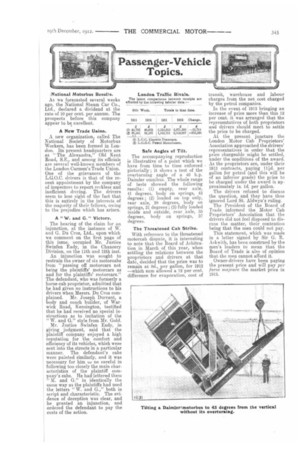Passenger-Vehicle 0
Page 9

If you've noticed an error in this article please click here to report it so we can fix it.
Topics.
As we forecasted several weeks ago, the National Steam Car Co., Ltd., declared a dividend at the rate of 10 per cent. per annum. The prospects before this company appear to be excellent.
A New Trade Union.
A new organization, called The National Society of Motorbus Workers, has been, formed in London. Its present headquarters are at " The Alexandra,' Old Kent Road, S.E., and among its officials are several well-known members of the London Carmen's Trade Union. One of the grievances of the L.G.O.C. drivers is that of the recent appointment by the company of inspectors to report reckless and inefficient driving. The drivers seem to lose sight of the fact that this is entirely in the interests of the majority of their fellows, owing to the prejudice which has arisen.
A " W. and G. " Victory.
The hearing of the claim for an injunction, at the instance of W. and G. Du Oros, Ltd., upon which we comment on the first page of this issue, occupied Mr. Justice Swinfen Eady, in the Chancery Division, on the 11th and 12th inst.
An injunction was sought to restrain the owner of six motorcabs from "passing off motorcars not being the plaintiffs' motorcars as and for the plaintiffs' motorcars." The defendant, who was formerly a horse-cab proprietor, admitted that he had given no instructions to his drivers when Messrs. Du Oros complained. Mr. Joseph Durrant, a body and coach builder, of Warwick Road, Kensington, testified that he had received no special instructions as to imitation of the "W. and G." style from Mr. Gold. Mr. Justice Swinfert Eady, in giving judgment, said that the plaintiff company enjoyed a high reputation for the comfort and efficiency of its vehicles, which were sent into the streets in a particular manner. The defendant's cabs were painted similarly, and it was necessary for him to Ise careful in following too closely the main characteristics of the plaintiff company's cabs. He had lettered them "M. and G." in identically the same way as the plaintiffs had used the letters "W. and G.," both in script and characteristic. The evidence of deception was clear, and he granted an injunction, and ordered the defendant to pay the costs of the action.
The accompanying reproduction is illustrative of a point which we have from time to time enforced pictorially ; it shows a test of the overturning angle of a 40 h.p. Daimler omnibus. The whole range of tests showed the following results : (1) empty, rear axle, 41 degrees, body on springs, 43 degrees ; (2) loaded on top only, rear axle, 22 degrees, body on springs, 31 degrees ; (3) fully loaded inside and outside, rear axle, 35 degrees, body on springs, 37 degrees.
The Threatened Cab Strike.
With reference to the threatened rnotorcab dispute, it is interesting to note that the Board of Arbitration in March of this year, when settling the relations between the proprietors and drivers at that date, decided that the price was to remain at 8d., per gallon, for 1912 —which sum allowed a 12 per cent, difference for evaporation, cost of transit, warehouse and labour chargea from the net cost charged by the petrol companies.
In the event of 1913 bringing an increase of price more than this 12 per cent. it was arranged that the representatives of both proprietors and drivers should meet to settle the price to be charged.
At the present juncture the London Motor Cab Proprietors' Aesociation approached the drivers' representatives in order that the price chargeable might be settled, under the conditions of the award. As the proprietors are, under their 1913 contracts, paying 111d. per gallon for petrol (and this will be of an inferior grade) the price to be charged under the award is approximately Is. id. per gallon.
The drivers refused to discuss the question, and they have thus ignored Lord St. Aldwyn's ruling.
The President of the Board of Trade informed the Motor Cab Proprietors' Association that the drivers did not feel disposed to discuss the matter, their contention being that the men could not pay.
This statement, which was made in a letter signed by Sir 0. R. Ask with, has been construed by the men's leaders to mean that the Board of Trade is also of opinion that the men cannot afford it.
Owner-drivers have been paying the present price and will pay per force majeure the market price in 1913.




















